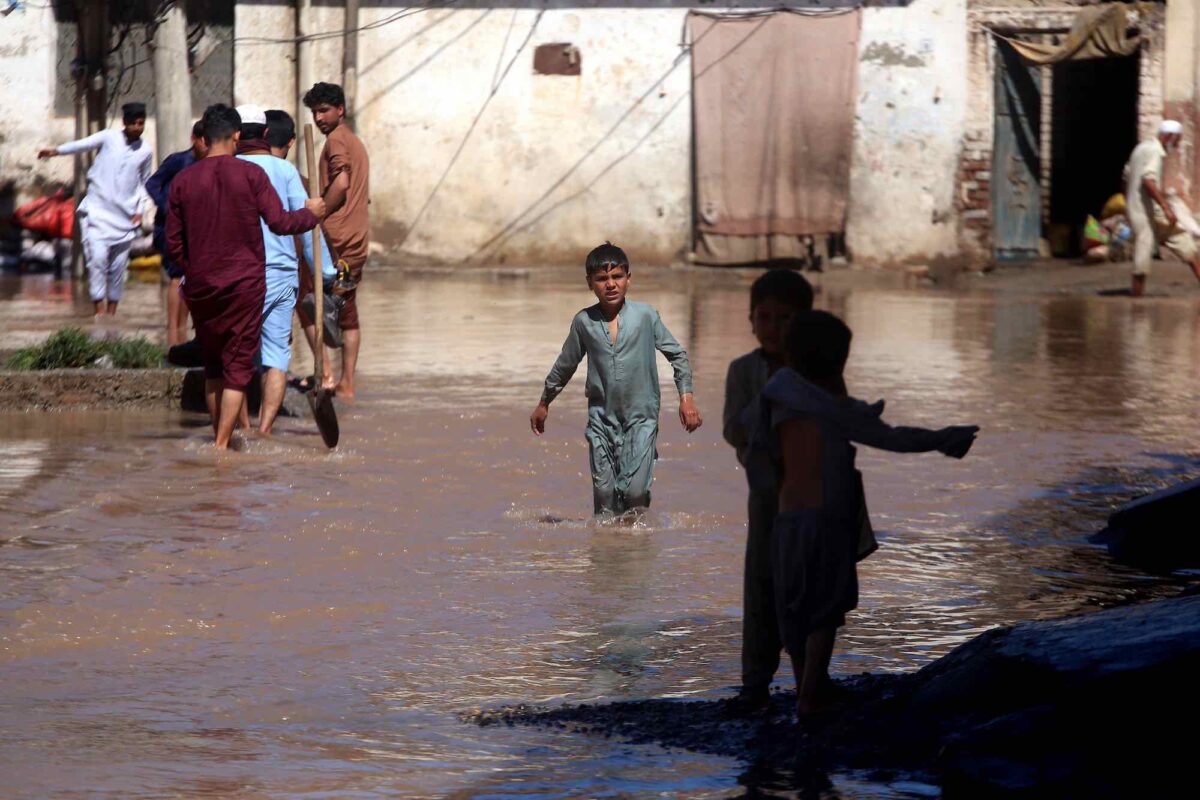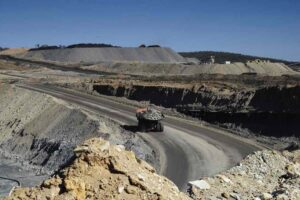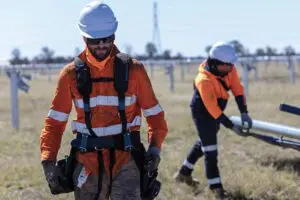I have flashes of climate grief, recognition in photographic bursts: Pakistani cotton farmers walking through knee-deep water trying to salvage a few white puffs of income off blackened plants; precious graves of ancestors being inundated by the sea in Fiji, the Torres Strait Islands, Tonga, Tuvalu, Samoa, the Marshall Islands; the view of fire-ravaged forests, white smoke sky and black trunks in Yosemite National Park, Namadgi National Park, so many places that should be verdant.
I continue to order a new washing machine, feed the cat, work with others across the globe on how to reduce our dependence on coal, oil and gas, read novels, go to yoga classes, as is conventional. I’ve been working on trying to prevent catastrophic climate change for three decades.
I’ve repeated, whenever anyone was willing to listen, “never underestimate the human capacity for denial.”
Our ability to believe the impossible prepares us for art, stories, religion … propaganda, deception.
In discussing the psychological manipulation of abusive relationships, American researcher and therapist Dr Bessel van der Kolk told a trauma course I attended, “I’ve never met a woman who gave up on a [coercively controlling] relationship.”
In my case, it took an act of courage by a stranger in a supermarket carpark. In the aftermath, as I hit the red ‘end call’ button, reality’s freight train knocked my neurons sideways and I realised “I am in one of those situations.”
The fossil fuel companies and their enablers entice addiction to their products. They sell cars and oil as sex and freedom; plastics as modernity and convenience; methane, which increases the risk of asthma in children on par with passive smoking, as ‘natural’ gas.
We could have had electric vehicles decades ago if the automobile and oil industries hadn’t conspired against them. Exxon employed first class climate scientists in the 1980s. They knew, they lied.
Oil, gas and coal and their authoritarian regimes sports wash. They sponsor children’s teams, buy the game of golf for legitimacy, pretend to be human.
Coercive controllers periodically do something surprisingly nice – a trip away, some small unexpected freedom, a kitchen renovation, a bunch of flowers – enough pretence of care to keep us holding two contrary views of their character.
The vacillation between the repetitive cycle of abuse and intermittent gifts or temporary respites from rage messes with a victim’s brain. Interactions between dopamine (craving, seeking, wanting), oxytocin (the bonding hormone), endogenous opioids (drugs we produce internally promoting pleasure and pain, as well as withdrawal and dependence) and corticotropin releasing factor (produced in response to stress) become significantly dysregulated, resulting in an emotional attachment to the abuser or abusive organisation, such as in a cult. Research is ongoing into this complex neurochemical hijacking known as “traumatic bonding.”
We appreciate the comforts we receive via fossil fuels. And they spend billions every year telling us how good they are for us, how essential they are to our lives.
Meanwhile, the oil and gas industries indulge in war profiteering. In 2022 global profits were $US4 trillion, $US2.5 trillion up on average.
The costs are hidden, as in air pollution (annual cost estimated $8 trillion in 2019, equivalent to six per cent of global GDP according to the World Bank); in the poorest communities like Cancer Alley, an 85-mile stretch of land along the Mississippi River between Baton Rouge and New Orleans, which contains over two hundred petrochemical plants and refineries; in the tens of thousands of locations worldwide where PFAS ‘forever chemicals’ are in the water and the bodies of residents, as well as impacting sea lions, tigers and over 330 other species.
On average each of us now consumes a credit card’s worth of plastic every week.
So why don’t we leave?
Armies of enablers surround fossil fuels. Global PR consultancies trade notes on what works best for the public to forgive an oil spill, a gas explosion, a chemical leak. Consultants spout “technology neutral” advice to governments with gas as central to economic development plans.
A lawsuit filed in June 2023 by Multnomah County, Oregon alleges, “McKinsey has coordinated and participated in a deliberate misinformation campaign to downplay and/or outright deny the causal relationship between the greenhouse gas emissions of its members and extreme weather events.”
Thanks to valiant New York Times journalists Jodi Kantor and Megan Twohey we know about the infrastructure of enablers around Harvey Weinstein. Those on his payroll, buying his bullshit, downplaying his horrors, scared to speak out. Some of those who saw his evil left.
Alex Hillman, carbon emissions analyst at Woodside, a large Western Australia-based oil and gas producer, left after eight years of trying to change the company from the inside. Journalist Emily Townsend quit News Corp because of its climate change denial and lies. These are courageous acts of people who can no longer live with cognitive dissonance.
We’ve been gaslit that all that is needed is individual behaviour change; our guilt and penance is the solution to this crisis.
In dire cases of gaslighting, the consequences, including reduced cognitive function, are used against victims by the person who inflicted the traumatic brain injury.
Longtime New Zealand domestic abuse worker Rachel Kain says, “They’re told that they’re stupid, or that they’re dumb, and they’re a bad mother and everything, because of the effects of the violence.”
Predators seek to excuse their behaviour, their drive to perpetrate violence towards someone who was vulnerable by doing the instinctive thing of blaming their victim. As biologist Robert Trivers suggests, the first step to deluding others is to delude yourself.
Patriarchy has created a framing and narrative with an easy emotional out for male abusers, their enablers and society at large. We fall for the trope of victim blaming because the alternative, that sexual abuse, rape, child sexual abuse and incest are common, is not something patriarchy wants us to know.
To confront it would involve overturning a morass of culture and institutions, especially the police and justice systems. Also, abusers tend to be charming and persuasive.
Research suggests that a woman may try to leave an abusive relationship on average seven times before she is successful, if she is successful.
Corporations are not human. Nor are the national oil and gas companies, especially not those in despotic regimes. The purveyors of fossil fuels have no empathy, no conscience. They are selling us denial, delay and false solutions with feelgood names like carbon capture and storage and blue hydrogen.
The fossil fuel industries leak toxic substances into our air, waterways, soil and oceans with impunity. The poisoning is literal, as well as corrosive to our democracies, when politicians are convinced their states’ economic wellbeing depends on coal, oil or gas.
The consequences of our collective delusions about climate change are, as the late public and environmental health expert Professor Kirk R. Smith put it, “The rich will find their world to be more expensive, inconvenient, uncomfortable, disrupted and colourless; in general, more unpleasant and unpredictable, perhaps greatly so. The poor will die.”
People only leave abusive relationships when they have support, some level of realisation that they’ve been trapped, and somewhere else to go. Photographer Nan Goldin looked at the photos she’d taken of her bruises to remind herself never to return to her battering boyfriend.
There is somewhere else we can go: renewable energy, electric bicycles, we don’t need clothes made out of plastic. We can build twenty-storey buildings out of reinforced wood. We can make steel in electric arc furnaces. We can grow more trees than we cut down.
The truth of climate change is in the hurricanes, the record heat, the droughts, the landslides, the flooding, the choking smoke, the red sky burning.
Yet the fossil fuel companies tell us we can’t live without them, and that they are changing for the better.
It is not hope that gets people out of controlling relationships, that prompts survivors to speak up about the sexual abuse they have suffered. Hope did not keep me safe. And hope will not keep this planet safe.
Now is the time for courage. Now is the time to leave our abusers.
This article was originally published on Pearls and Irritations – John Menadue’s Public Policy Journal. Read the original version here.










